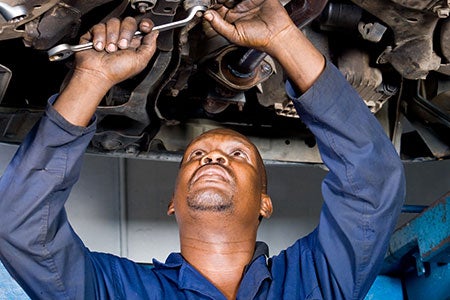Diesel Truck Service

Diesel Truck Repair and Maintenance
Earnhardt Ford doesn’t just sell commercial trucks. We also have a commercial fleet service center where we handle all kinds of heavy duty trucks. With our crew of certified Cummins and Allison technicians, you can rely on us for diesel truck repair, whether it’s for your personal ride or your fleet of hardworking pickups.
Diesel Truck Service
While our dealership brand is Ford, our mechanics are just as good at repairs for Chevrolet, Ram, GMC, and many more. When you trust your diesel truck to us, you can be sure that our highly qualified mechanics can handle the job. Here’s a sampling of our capability:
- Over 40 service bays
- Vehicle pick up and delivery available
- Shuttle service available
- Fleet Maintenance Plan Benefits
- Cummins diesel engine repair
- Service for Allison transmissions and other heavy duty transmissions
- Warranty repairs on Cummins engines and Allison transmissions
- Brake pads, rotors and drums
- Air Conditioning repair
- Power steering and suspension
Diesel Truck Maintenance Guidelines
The best way to stay ahead of problems is to follow the suggested maintenance schedule. Let’s take a look at the Ford 6.7L diesel pickup and learn from it the basics of keeping your truck in the best working condition. For your particular vehicle, we encourage you to check with the experts at our Ford Fleet Service Center.
Oil Changes
The engine oil and oil filter should be changed about every 7,500 miles. However, you have an instrument cluster message center that is there to alert you. This should warn you if you need an oil change earlier. There can be many reasons that a change is needed earlier, and you should be alert to how the truck is being driven and under what circumstances. You will need to increase the frequency if the truck regular encounters:
- High Heat Conditions
- Frequent long idles
- Stop-and-go driving
Getting a fresh filter and new oil provides many benefits. This ranges from catching an oil leak early to protecting the engine seals from damage. The engine seals need to stay soft and pliable. They can’t do that with old oil. Old oil is abrasive, and if it erodes the engine seals, there may be multiple leaks. Furthermore, old oil abrasiveness can harm other moving parts in the engine. Regular oil changes can keep the truck on the road and out of the junkyard.
Fuel Filter Change
The message center should alert you to when you need a fuel filter change. However, a good rule of thumb is to do it at 15,000 miles.
What does the fuel filter do? It is critical to keeping the injectors clean and free of contaminants and water. When the injectors are working, they are dealing with a fuel pressure of 36,000 PSI. This causes any contaminant to turn into a cutting tool, slowly destroying the injector. If you can prevent this from happening, you’ll save hundreds of dollars per injector plus the labor costs which are substantial due to access issues.
Coolant Strength
You should check your coolant regularly, especially in our hot weather conditions. It must be kept at the right 50/50 mix ratios. There are test strips that can help you see for yourself if the mixture is right. The strength should be checked after 600 hours of driving or 15,000 miles.
At every oil change, be sure to ask for a coolant check. At 72 months or 105,000 miles, it is time for a complete flush. After that, it should be flushed every 45,000 miles. In our hot summers, you’ll be glad you made sure your coolant mixture was right.
Who Should You Trust for Diesel Truck Repairs?
When there is a significant issue of any kind with your diesel truck engine, your truck needs a mechanic with an advanced understanding of diesel engines. That’s the Earnhardt Commercial Service Center. Schedule an appointment online or call today.

